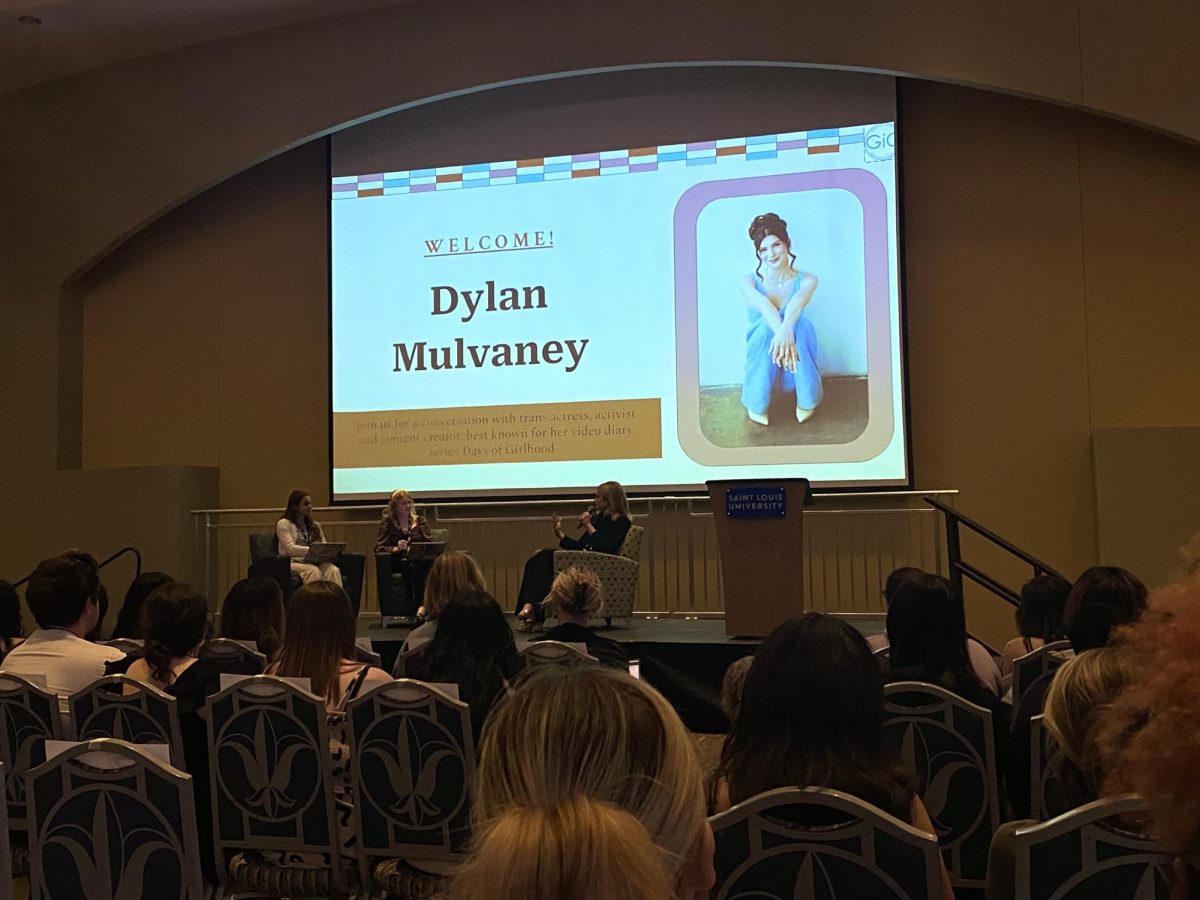For the next 10 days, students-commuters, residents, males, females, freshmen, seniors-will have to refresh their knowledge of the Greek alphabet.
With 11 fraternities and four sororities comprising over one thousand men and women, the Greek system at Saint Louis University cannot be overlooked.
However, at approximately 17 percent of campus, the Greek system by no means runs the school.
Through the process of Greek Rush, students will get the chance to discover what Greek life is all about and whether or not it is for them.
“Looking back, it’s been one of the greatest things in my life,” said Phi Delta Theta President Brent Stevens.
While some Greeks may not feel so strongly, Greek life impacts the entire SLU community through social activities, philanthropies and scholastic achievement.
Rushing To Join
Beginning yesterday afternoon for men and tonight for women, Rush allows students the chance to examine Greek life and decide if it’s right for them.
Fraternity rush differs greatly from sorority rush, but both focus on bringing new members into their respective organizations.
“It’s basically 10 days to figure out the character of each fraternity,” explained Mike McCoy, interim Interfraternity Council rush chair along with Schad McGovern.
Rush, is a mutual selection: Greek organizations choose whom they would like; rushees can choose to attend certain groups more often than others or decline a bid.
Fraternities plan a variety of events beginning Thursday evening. Activities range from eating chicken wings at Hooters to skeet-shooting and go-cart riding.
All fraternity events are free to rushees.
“Rush is a time to get reacquainted with friends you left over the summer and also a time to make new friends,” said Sigma Phi Epsilon Vice President of Recruitment Mike Liebetrau.
Next Friday, fraternities will send out bids to those rushees who they feel will fit their fraternity.
In contrast, sorority rush is held in the Busch Memorial Center; it costs $20 to attend.
According to Linda Wardhammer, associate director of Student Life and Greek advisor, the goal of sorority rush is to present the sororities on an equal playing field.
“Success equals parity,” Wardhammer said, “with chapters at a similar size and with similar resources.”
Sororities will hold an informational meeting tonight. Their rush starts officially Saturday morning.
During rush, sorority members are under a silence period when around rushees outside of rush events. They are to only discuss their sorority when at rush events.
On Tuesday night, all women rushing will get a chance to see the four sororities and what they are about.
Wednesday night is Philanthropy Night during which all sororities will make crafts with their rushees for their respective philanthropies.
Invitational Night will be held on Thursday. Sororities will perform skits to display more about themselves to the prospective members.
Rush events conclude on Saturday with Preferentials. During this night, sororities show the serious side of their sisterhoods.
Bids will go out on Sunday for women.
Every year, Greek Rush receives criticism for its proximity to the beginning of school.
As Bobbi Tucker, president of Panhellenic Council, explained, many larger state universities, such as University of Missouri Columbia, hold rush prior to the start of school.
“It’s good to find someplace to fit in right from the start,” Tucker added.
Another important component of Greek Rush is the dry rush policy.
“Dry rush is one of those gray areas,” said IFC President Brian Black.
The policy is that no Greeks should be in the process of recruitment with any alcohol present. Simply put, Greeks are not to drink alcohol with rushees present. This policy went into effect at the beginning of school.
For potential rushees, Liebetrau offered his advice, “Get out and visit as many rush events as possible from different fraternities. Experience everybody before you make a decision.”
“Try it and see if its for you,” added Kate LaBoube, president of Kappa Delta sorority.
A Place To Call Home
“I’d love to have a house, but I don’t know if I’d love to be president if we had a house,” said Pi Kappa Alpha President Adam Peete.
Summing up the feeling of many, Peete expressed the dual qualities of having Greek houses.
Last year, Greek residents claimed DeMattias Hall as their own. With floors divided between sororities and fraternities as well as chapter rooms, the residence hall quickly began to take on its identity.
However, Greeks returning to DeMattias this fall found freshmen and transfer students in their old chapter rooms and on their floors.
“DeMatt is a good stepping ground,” Black said. “We’ve handled everything they’ve thrown at us with a grain of salt.”
Black, a member of Sigma Chi fraternity, which is the only fraternity to have its own house, thinks houses give each fraternity an identity.
“It also would give SLU a big school feel,” Black added.
As Meghan Clune, president of Gamma Phi Beta, explained, the benefits of having your own space and community must be weighed against the disadvantages of financial obligations.
A committee to look into the possibility of Greek housing was formed last year under the direction of Brent Stevens, Phi Delta Theta president.
“The committee was formed to investigate the options with a long-term focus,” Stevens said. “We have to weigh the pluses and minuses.”
Greek Advisor Linda Wardhammer made no secret of her views but supported the exploration of alternative housing solutions.
“While I’m willing to work with them to explore, my personal opinion is that we are better off with what we have now,” Wardhammer said.
She also hopes the committee will consider options such as a specially designed Greek residence hall or some other setup. “That would be a wiser move,” Wardhammer added.
Wardhammer fears that houses may divide Greeks from the rest of the campus.
“Not only do Greeks currently live and learn among each other but with all students,” she explained.
Larry Davis, community development coordinator for DeMattias Hall, said “I think DeMatt shows people that we want more. However, it’s really up to the Greeks that they are responsible, take care of the place and can fill it.”
Some Greeks would like to be given the chance to have a house.
“You don’t know what you’re missing unless you have a house. It’s like a missing piece,” said Eric Wirtz, president of the newest fraternity on campus-Beta Theta Pi.
No Animals Here
Twenty-two years after “Animal House,” the movie continues to plague Greek organizations.
Creating the well-known stereotype of the drunken frat boy and stuck-up sorority girls, fraternities and sororities at SLU must constantly fight to show fellow students, potential rushees and parents that they do not fit the stereotype.
“This isn’t Animal House,” said Stevens. He added that his national fraternity recently banned alcohol in all fraternity houses.
Clune said, “There is the misconception that we are all about social activities; it’s easy to identify Greeks as the partiers on campus because we have organized events.”
The best way to combat the stereotypes is to “live the non-stereotype,” Wirtz said.
Katie Mellor, president of the newest sorority on campus-Sigma Kappa, told her story of stereotyping. “A majority of my friends are not Greek. A lot of people thought I’d lose my individuality. Now they see I’m still the same person; I just have another aspect of my life.
“We are straightforward in rush, make our philanthropy very public and work hard for good grades,” LaBoube explained.
Philanthropy is one way Greeks fight the stereotypes.
“Social fraternities have a social obligation to the community,” Black said.
Clune said, “Philanthropy is equal to or more a part of the organization than the social part.”
Not For Everyone
While Greek life offers a variety of social, philanthropic and scholastic opportunities, it isn’t for everyone.
“There’s no pressure to do it,” said Sarah Stabenfeldt, a biomedical engineering junior. “It’s just something I didn’t want to do.”
Matt McCarthy, a junior, added, “They’re not so bad. They’re more hard-core elsewhere.”
Freshmen Kevin Kerns and Bill Gruenloh will be rushing this week.
“I want to find out more about Greek life,” Gruenloh said. “If I like it, I’ll probably join.”
For better or worse, Greeks are here to stay, and if the trend at SLU continues, they may be growing.
“In general, our Greek system is in a pretty good place,” Wardhammer concluded. “That doesn’t mean we’re perfect.”






